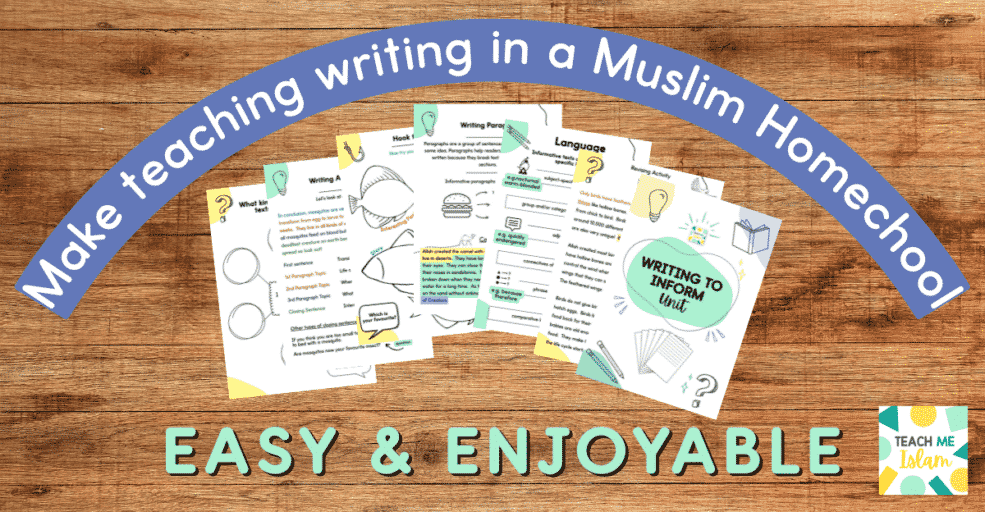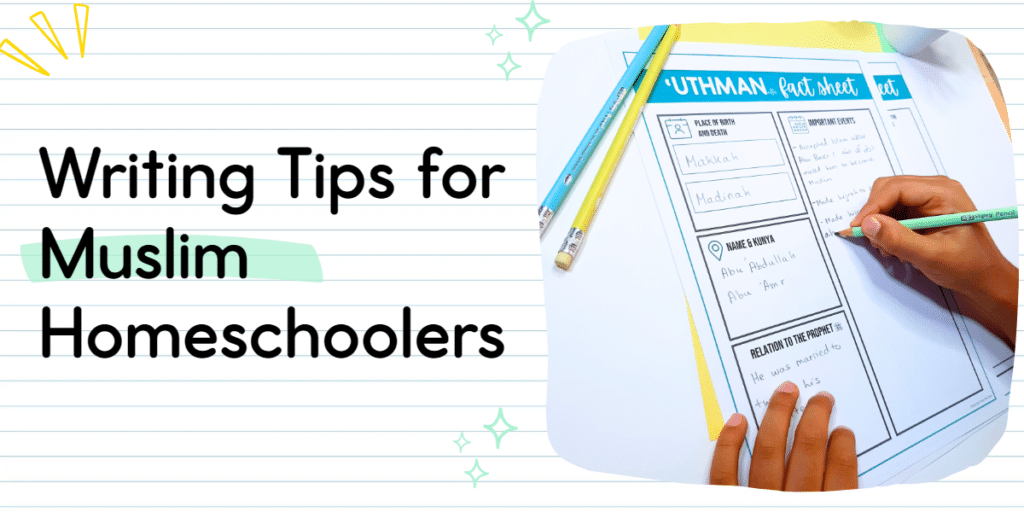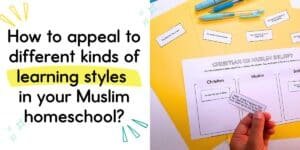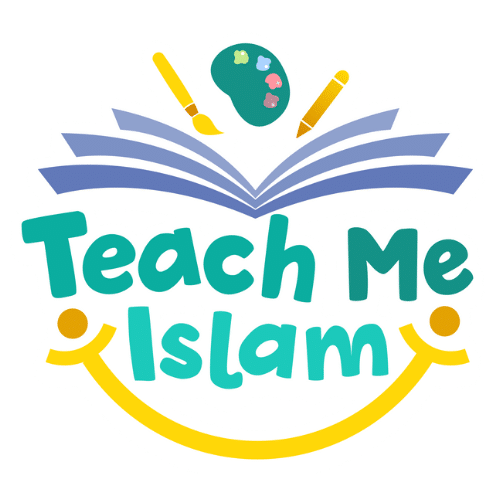Most homeschoolers I chat to mention that writing can be a struggle for at least one of their kids. They stare at a blank page or write a few lines and get distracted. This can be demotivating for you as a homeschooling parent as writing lessons become a chore for both of you. The focus becomes just getting something on the page rather than on really learning about the writing process. When I was researching for the Writing to Inform Unit Study, I researched ways to encourage kids to enjoy writing inshaAllah and I’m excited to share eleven writing tips for Muslim homeschoolers here!
Du’aa
The first of the writing tips for Muslim homeschoolers is to start with asking Allah to grant us success. It adds barakah and helps us focus on approaching the activity with the best attitude. Remembering Allah before we begin lessons reminds us to be thankful for the blessing of kids and to be patient with any challenges.

Manage Your Expectations
Writing is not like riding a bike. You can’t teach your kids and then tick it off once they have learnt it. It’s a skill they will be continually honing from the moment they pick up a pencil until….well for the rest of their lives hopefully. It’s an incredibly positive thought, that there is always time to improve bithnillah and you can always get even better. It’s a cliché but we really are looking for progress over perfection. Your 8 year old won’t spell every word correctly. Frankly, it would be disappointing if they did, it would mean that they weren’t using words they were unsure of how to spell. All those misspelled words, missed punctuation and words with the wrong meaning are all signs that your child is trying to stretch themselves. If you give up the quest for perfection, writing becomes more enjoyable for both you and your children.

Edit Less
Now we are no longer striving for perfect writing, we can give up trying to correct everything. A page full of edits and corrections is despiriting and overwhelming. Just pick around 3 per page to focus on. Kids are far more likely to remember the correction for next time if the edits are kept to a manageable number.

Praise Lots
Try to find lots of aspects of their writing to praise. It will encourage them and also motivate them to replicate that good feature next time. Have you ever had a piece of work presented to you that was illegible, made no sense and lacked all structure? Look for even small things to praise such as one or two letters that were formed correctly, an attempt to use a challenging word, a good illustration, leaving a space between just two words. You don’t need to go overboard and say that the work was so great you are going to hang it up around the house, just find one or two details that you can genuinely praise. It makes them feel good about writing. Although criticism may sometimes breed short term results, for long term success praise is essential.
If you like the stickers featured above you can sign up to the e-mail list here to gain access to them and all the other freebies in the free resource library.

Appeal to their learning Style
Kids are expert learners, they use all their senses to learn. Research has shown however that identifying students’ learning strengths can help them succeed even further.
If you are teaching a writing concept for example paragraph writing, you could appeal to different learning styles in the following ways:
Visual Learner – use a picture of a hamburger to represent paragraph structure
Auditory – Make up a poem to help them memorise paragraph structure.
We use a hamburger and a bun,
To help make learning paragraphs fun.
The topic sentence is up first,
Then details till it’s fit to burst.
At end, a sentence to conclude,
To leave it out would just be rude.
Kinesthetic – Build a playdough model of a paragraph or use a cut and stick exercise to demonstrate the paragraph structure
Verbal – Supply lots of written examples for them to read and identify the parts of the paragraph structure.
Offer choice
Ideally children would be able to write what they are passionate about all the time. However, that’s not always possible. Offering a choice can help kids feel more interested in their subject. If they have to write about an animal, let them pick which one. Even a choice between just two options can help kids feel more invested in what they are writing.

Example Texts
How many times have you heard an explanation of something but only felt it click when you saw it in action. Demonstrating a skill can be really powerful and writing is no different. Example texts, particularly simple ones can really highlight to kids what exactly you want them to achieve. Sometimes when the content of a textbook or other resource isn’t ideal, it can be tempting to just skip over these texts. However, they can be key to your child’s understanding, so writing your own examples or using an Islamically integrated resource are desirable alternatives.

Practice
Writing is a skill and kids need lots and lots of practice. You don’t limit reading to lessons, you read to your kids before bedtime, take trips to a library, chat about your favourite books and provide books for them to explore on their own. In the same way, writing shouldn’t be limited to lessons either. You can provide paper to write letters and notes to each other, shopping lists and encourage kids to write messages to family members, create posters, greeting cards or even set up a free blog.
Opportunities to Share
Kids often love to share their work with an encouraging audience. Homeschooling doesn’t lend itself to class readings but ask them to read their work to a sibling, a supportive relative or even swap their work with a friend. When we know we are sharing our work with others we often put in more effort and kids are no different.
Choose Pen/Pencil
This is small but can make a big difference. Let kids choose their pen or pencil. If they want to write in purple colouring pencil today, why not? If it helps to make writing fun, it’s a win!

Celebrate their work
The last of the writing tips for Muslim homeschoolers is to celebrate their work. It takes time and effort to plan, write, review, edit and publish a piece of work. A celebration is in order. It doesn’t have to be fancy but an acknowledgement of the effort they have put in makes it all worthwhile for kids. You could display work on a board, or stick on the fridge, buy a special file to keep best work or take pictures and send to grandparents or aunts and uncles. It also acts as a natural measure of progress which is encouraging for both you and your kids. You can see their best work get even better inshaAllah and it makes all your hard work seem worth it!

I hope you found at least a few of these writing tips for Muslim homeschoolers helpful! If you are interested in an entire Writing to Inform unit designed for Muslim homeschoolers, you can find out more here.
Join the mailing list here to download a FREE set of writing prompts and gain access to the free resource library.
Here are some other blog posts you may be interested in:
Teaching Writing in A Muslim Homeschool
7 Reasons to teach about the Hijri Calendar
Should you use Islamically Integrated Resources or teach Islamic Studies separately?






